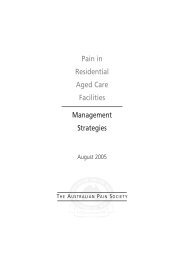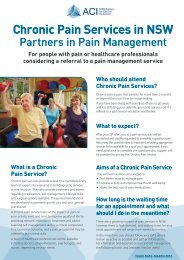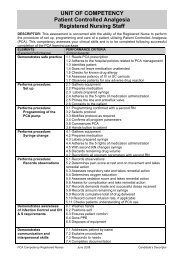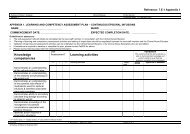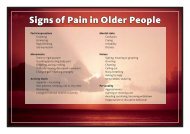The treatment of persistent pain - Australian Pain Society
The treatment of persistent pain - Australian Pain Society
The treatment of persistent pain - Australian Pain Society
Create successful ePaper yourself
Turn your PDF publications into a flip-book with our unique Google optimized e-Paper software.
issue. It is a requirement that all members <strong>of</strong> IASP Committees and<br />
Taskforces must be IASP members (<strong>Australian</strong> <strong>Pain</strong> <strong>Society</strong> membership<br />
is insufficient) and this is not unreasonable if you think about it.<br />
<strong>The</strong> current Directory <strong>of</strong> Members is the appropriate source to see<br />
the options for your consideration. If you are interested, please<br />
contact one <strong>of</strong> the APS Board members and they will arrange to<br />
have your name considered. Clearly, we are not in a position to<br />
guarantee that you will actually be <strong>of</strong>fered a position <strong>of</strong> your choice.<br />
What I can say is that historically, there has been regular and<br />
frequent representation; past members have contributed significantly<br />
and this has been appreciated by the IASP. So go to it!<br />
Ge<strong>of</strong>f Gourlay<br />
Directors' Meeting 30th September 2002<br />
� Planning commenced for the 2004 ASM in Canberra<br />
Provisional dates 7-11 March 2004<br />
Convenor Ge<strong>of</strong>f Speldewinde<br />
� Teleconference PIGNI – August 28<br />
� Approval for refundable deposit for block booking <strong>of</strong> Qantas<br />
flights to Christchurch for the 2003 ASM<br />
� Abstracts online. Website engineering $1,000 approved<br />
� Review <strong>of</strong> the ACHS/APS <strong>pain</strong> facility guidelines<br />
Shared costs with ACHS $2,000 approved<br />
� 2005 local organising committee financial support $6,000<br />
approved<br />
� Possibility <strong>of</strong> a Queensland satellite meeting for 2005 in<br />
association with the World Congress.<br />
� Elections due 2003: call for nominations to be sent by<br />
November 2002<br />
� APS / APRA PhD Scholarship applications to close Nov 2002<br />
� NICS awaiting minutes <strong>of</strong> exploratory meeting held 29 July 2002<br />
� Possibility <strong>of</strong> developing clinical practice guidelines on <strong>pain</strong> in<br />
the elderly with other interested organisations<br />
� Facility directory template to send to members to be developed<br />
C. Roger Goucke<br />
8<br />
Julien P. de Jager FRACP<br />
President, <strong>Australian</strong> Rheumatology Association<br />
Interviewed by Dr Sue Inglis<br />
Who was/is your most influential mentor? I ‘ve had many, but the<br />
late Dr Brian Billington, gastroenterologist at Prince <strong>of</strong> Wales Hospital,<br />
and Dr Milton Cohen at St Vincent's Hospital in Sydney (still very<br />
much alive) would top the list.<br />
Most challenging patient? A young lawyer with severe destructive<br />
rheumatoid arthritis who was very poorly compliant with <strong>treatment</strong>,<br />
requiring narcotics for <strong>pain</strong> relief, bilateral hip replacements, requiring<br />
knee, metacarpal replacements and triple fusions <strong>of</strong> her feet. We<br />
finally had a showdown where I requested she find another<br />
rheumatologist and since then we have got along famously!<br />
Most rewarding experience in medicine? Seeing a young lady with<br />
severe juvenile arthritis and SLE go into remission on therapy, then<br />
graduate from Uni, and marry a great young man. <strong>The</strong>se rewards come<br />
every week mixed with all the <strong>treatment</strong> failures and adverse reactions!<br />
What would you advise those starting out in the field?<br />
Never give up, whether it is passing exams or puzzling out a problem,<br />
and do it all for the people we are committed to serve. <strong>The</strong>re is good<br />
in everyone, but make the most <strong>of</strong> those inspirational patients who<br />
carry you through difficult times with the others.<br />
How has medicine changed since you started out? We have<br />
come full circle, I think. I am from a family <strong>of</strong> lawyers and was inspired<br />
to do medicine by our family doctor, and family friends who were<br />
doctors, with their incredible dedication. <strong>The</strong>n during training (70s and<br />
early 80s) the world was all about satisfying the individual, and<br />
technological advances. This isolated many doctors from the very thing<br />
that makes medicine so worthwhile. It is pleasing to see the curricula<br />
<strong>of</strong> medical schools, and the emphasis in general practice in the last<br />
10 or more years redressing that. We are back to the situation where<br />
our responsibility is first to the patients and their needs.<br />
If you weren’t a doctor what would you like to be?<br />
I have never wanted to do anything else.<br />
What book are you reading at the moment?<br />
Peter Carey's ‘True History <strong>of</strong> the Kelly Gang’.<br />
Your favourite saying? "Send not to know for whom the bell tolls,<br />
it tolls for thee", by John Donne who was vicar <strong>of</strong> St Paul's. <strong>The</strong><br />
preceding lines are usually omitted, but are even more inspirational<br />
"Any man's death diminishes me, because I am involved in mankind".<br />
Julien P de Jager, FRACP, President, <strong>Australian</strong> Rheumatology Association<br />
dejager@ozemail.com.au



